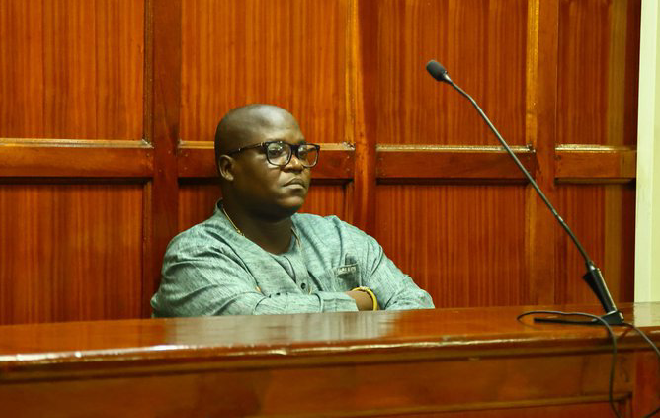A Nairobi court has ordered the detention of businessman Salim Frejus Hector Joyau Ahossi for 10 days to facilitate investigations into an alleged Ksh 712 million gold scam.
Ahossi, a dual citizen of Benin and Canada, is accused of defrauding Canadian national Maxime Harouna Sawadogo through a sophisticated international scheme.
The accusations, presented by the Kenyan Director of Criminal Investigations (DCI), shed light on an elaborate web of deceit involving the promise of substantial returns from gold sales across multiple countries.
The court’s decision reflects concerns that Ahossi, who lacks a fixed address in Kenya, may flee the country before investigations conclude.
His case serves as a poignant reminder of the challenges surrounding transnational crimes and highlights Kenya’s ongoing battle with fraudulent gold dealings, which have repeatedly attracted international attention and caused major economic damage.
The alleged scam traces back to 2022 when Sawadogo, a Canadian national, first met Ahossi in Canada, specifically within a church setting.
According to the DCI, Ahossi presented himself as a businessman involved in the lucrative African gold trade, a sector that has recently attracted interest due to the growing demand for precious metals worldwide.
Ahossi reportedly convinced Sawadogo of a unique opportunity, he could profit by investing in African gold intended for Belgian buyers. With promises of high returns, Ahossi effectively painted a picture of a low-risk investment yielding lucrative rewards.
Over the following two years, Sawadogo claims he transferred approximately USD 5.47 million (equivalent to Ksh 712 million) to Ahossi’s accounts to facilitate these supposed gold transactions.
However, Sawadogo alleges that every attempt to retrieve the gold or receive his promised returns met with repeated obstacles, leading him to suspect that the transactions were far from legitimate.
Each delay in Sawadogo’s dealings with Ahossi came with its own explanation, ranging from policy changes in Ghana to customs issues in Dubai, and, finally, the relocation of the gold to Kenya.
These ever-shifting explanations cast doubt on Ahossi’s intentions and led Sawadogo to suspect foul play, ultimately resulting in the involvement of Kenyan authorities.
In court, Charles Odhiambo, representing the DCI, argued for Ahossi’s detention based on his potential flight risk.
Ahossi’s dual Beninese and Canadian citizenship, along with his lack of a fixed residence in Kenya, raised concerns that he might attempt to evade Kenyan jurisdiction.
As Odhiambo noted, cases of cross-border fraud are complex and require thorough investigation to ensure justice.
Kenya, like many other nations, has faced challenges with gold scams that often involve elaborate operations across multiple countries, which allow suspects to avoid apprehension by moving through jurisdictions with varying levels of enforcement.
Gold scams are not new to Kenya, and the country has increasingly gained notoriety as a hotspot for fraudulent gold dealings.
Unscrupulous dealers and con artists frequently use Kenya as a transit point for their schemes, often enticing foreign investors with promises of significant returns from gold purportedly sourced from mineral-rich African nations.
As a result, both individuals and businesses worldwide have been affected, and Kenyan authorities have had to step up measures to counter these activities.
Gold scams typically prey on individuals unfamiliar with the intricacies of the gold trade.
Many of these schemes follow a pattern similar to that alleged in Ahossi’s case:, the victim is first introduced to the idea of investing in African gold, often with the prospect of selling to high-paying buyers in Europe or Asia.
Once the victim agrees, they are asked to make an initial investment to cover expenses related to transport, customs, or policy compliance.
However, these investments often disappear without a trace, leaving the victim with nothing to show for their trust and investment.
In recent years, Kenyan authorities, including the DCI, have made strides in exposing and dismantling gold scam networks.
However, these crimes continue to proliferate, partly due to the involvement of international players and the ability of fraudsters to exploit weaknesses in international cooperation.
The court’s decision to detain Ahossi highlights the seriousness with which Kenyan authorities are handling the matter and reflects a growing commitment to bring perpetrators of transnational crimes to justice.
For Sawadogo, this experience has proven costly, both financially and emotionally.
His story is a cautionary tale for investors worldwide, reminding them to exercise due diligence when engaging in unfamiliar markets, especially those with reputations for fraud.
Ahossi’s case is set to proceed as the DCI continues its investigation.
The Kenyan judiciary’s response may set a precedent for handling transnational financial crimes, marking a step toward restoring investor confidence and curbing the prevalence of such scams in the region.
The international community will be watching closely, as the case not only sheds light on the underbelly of the gold trade but also highlights the global nature of fraud in today’s interconnected world.





















Add Comment